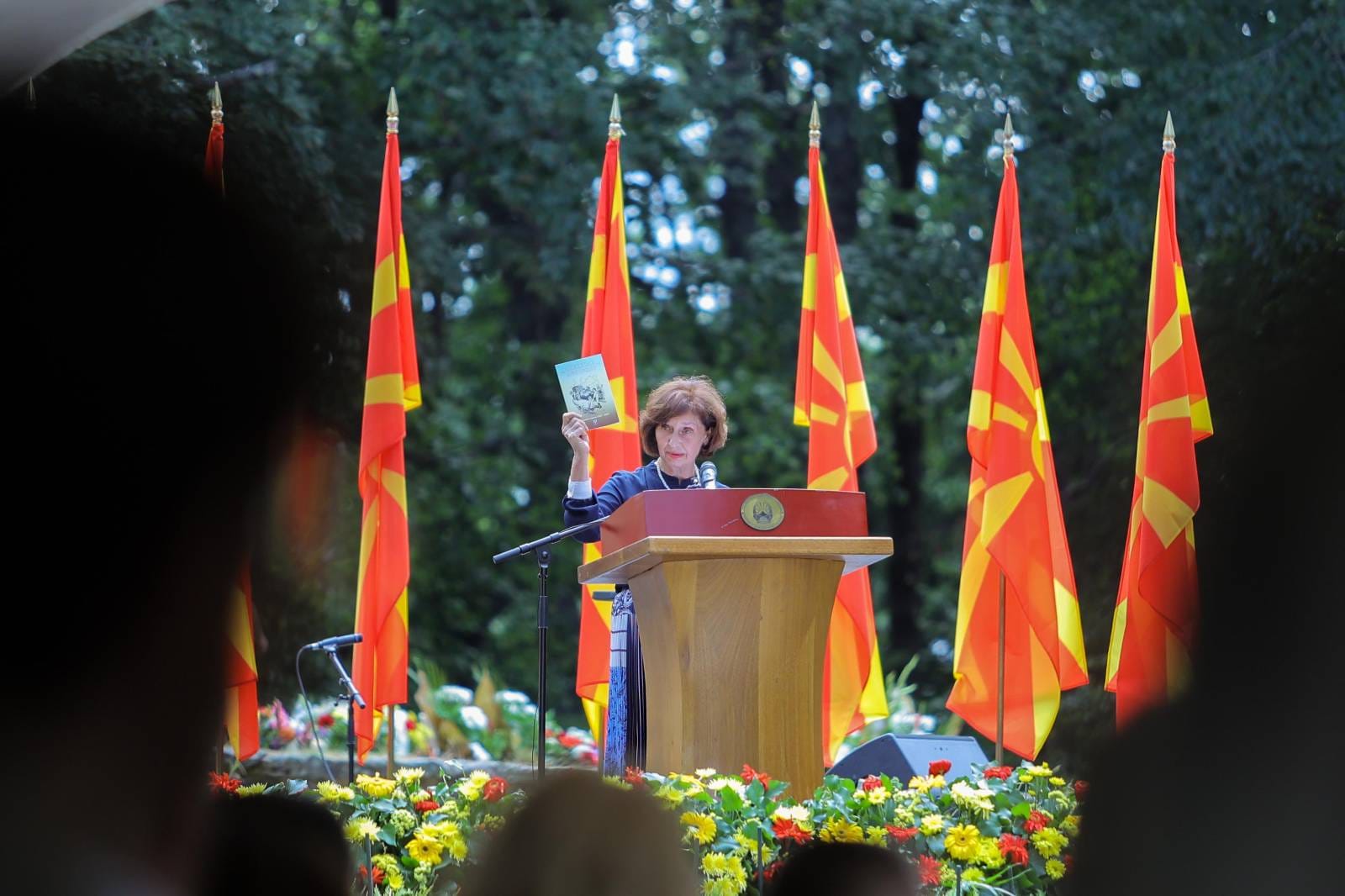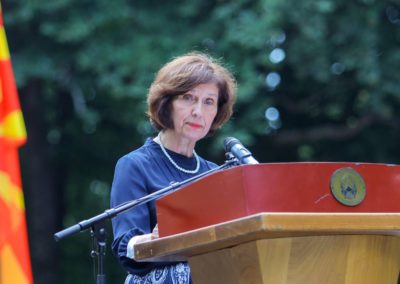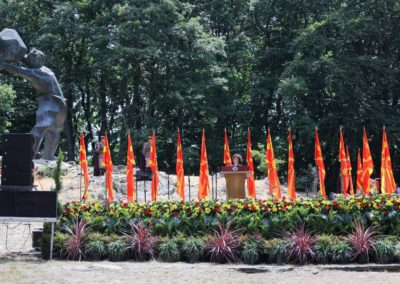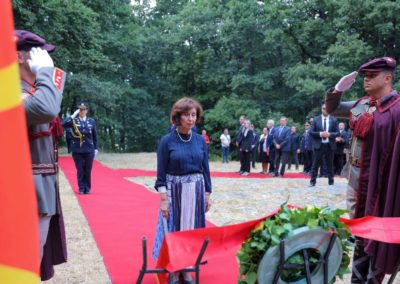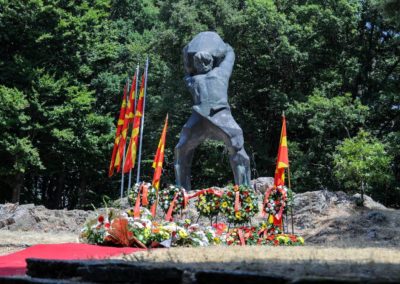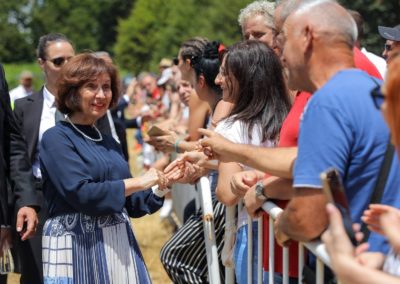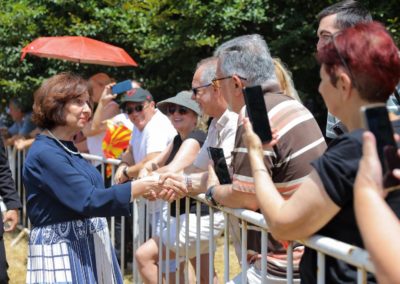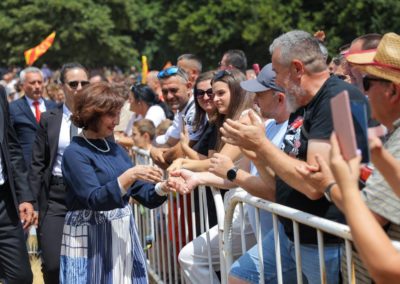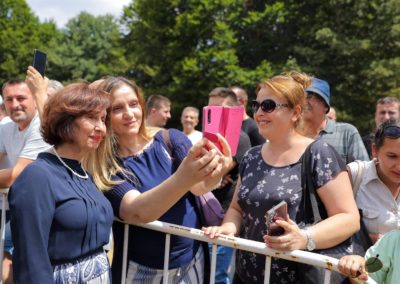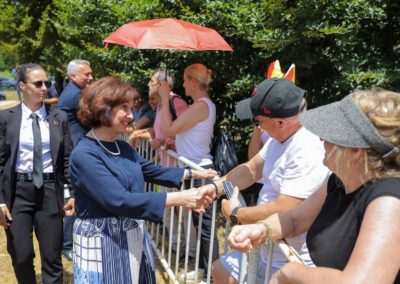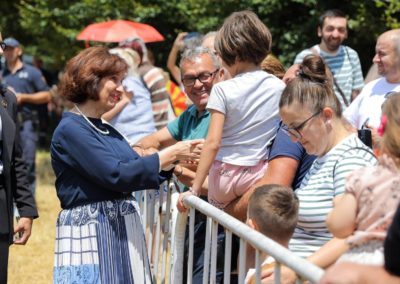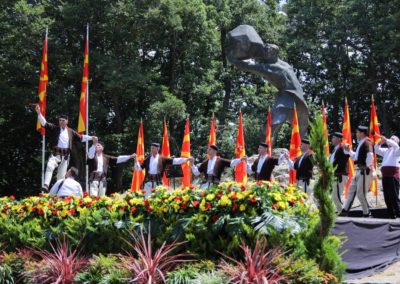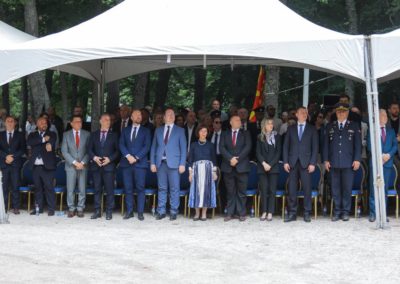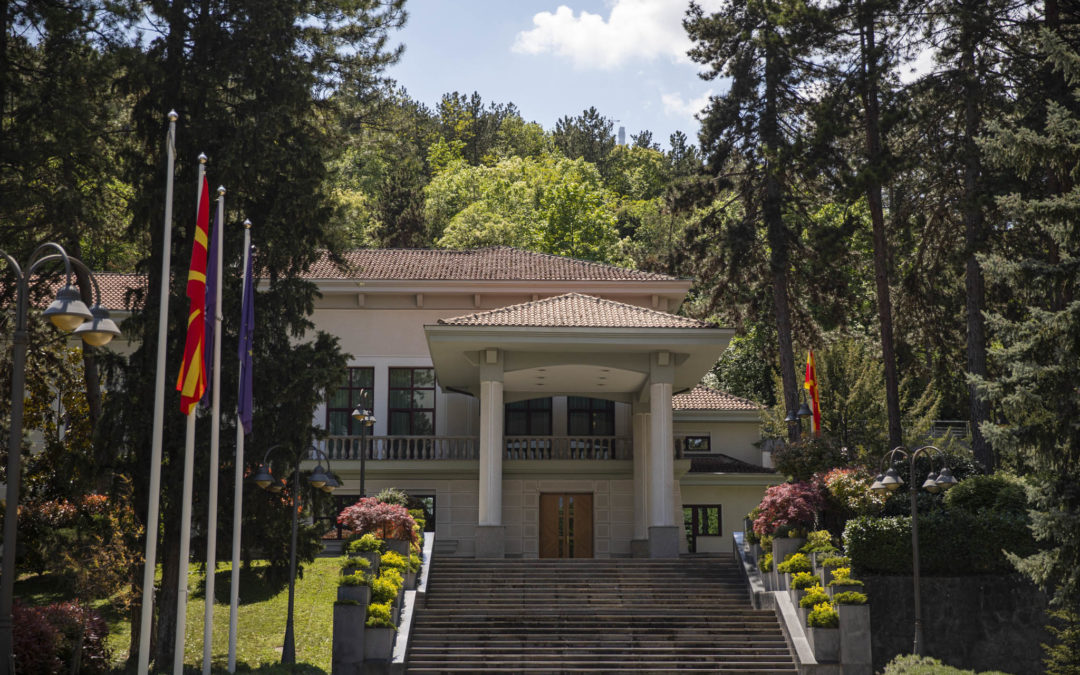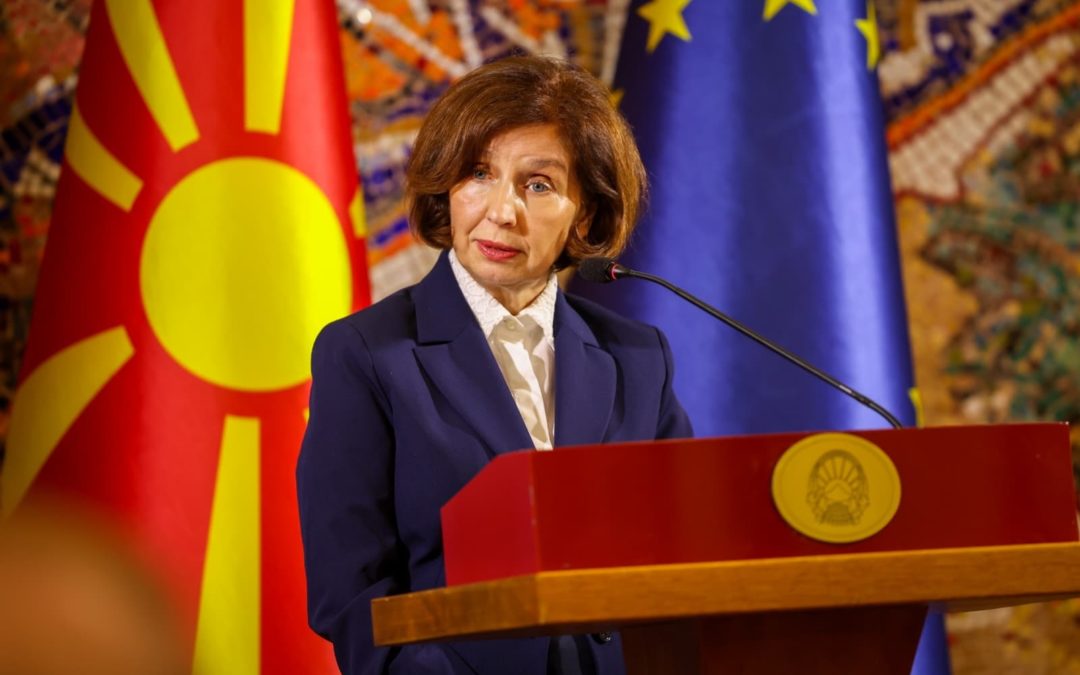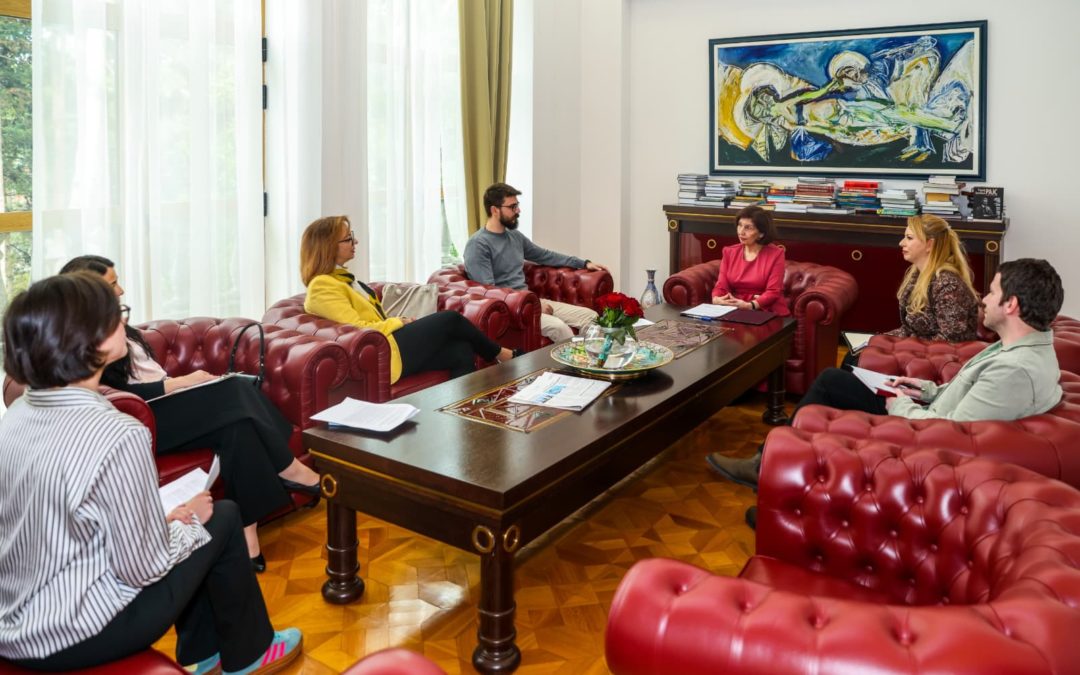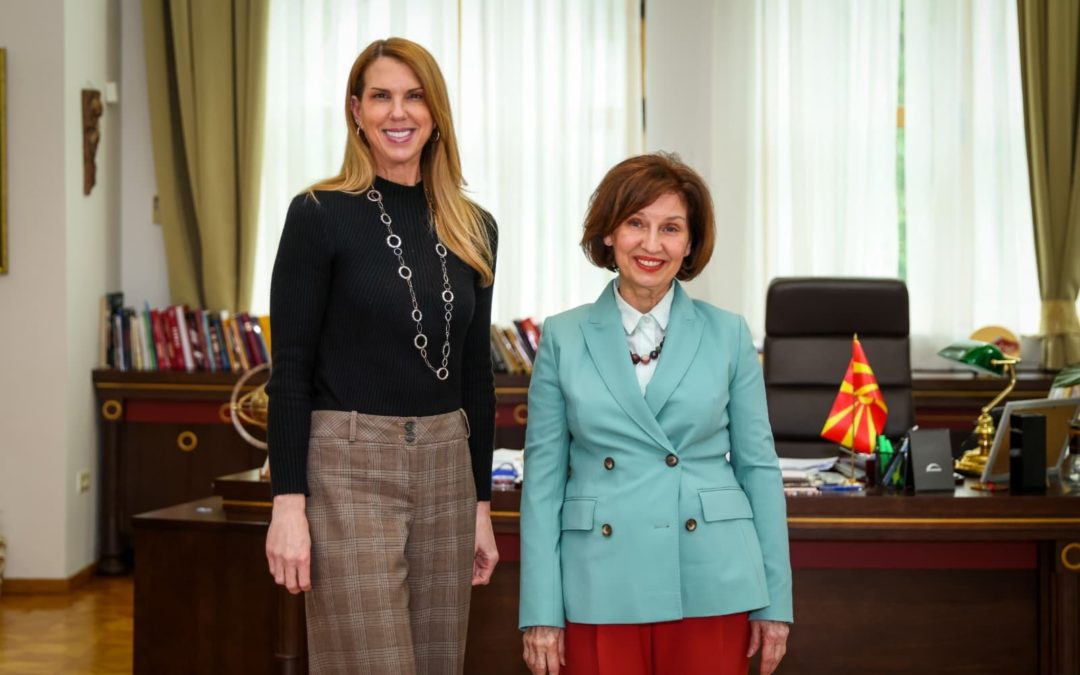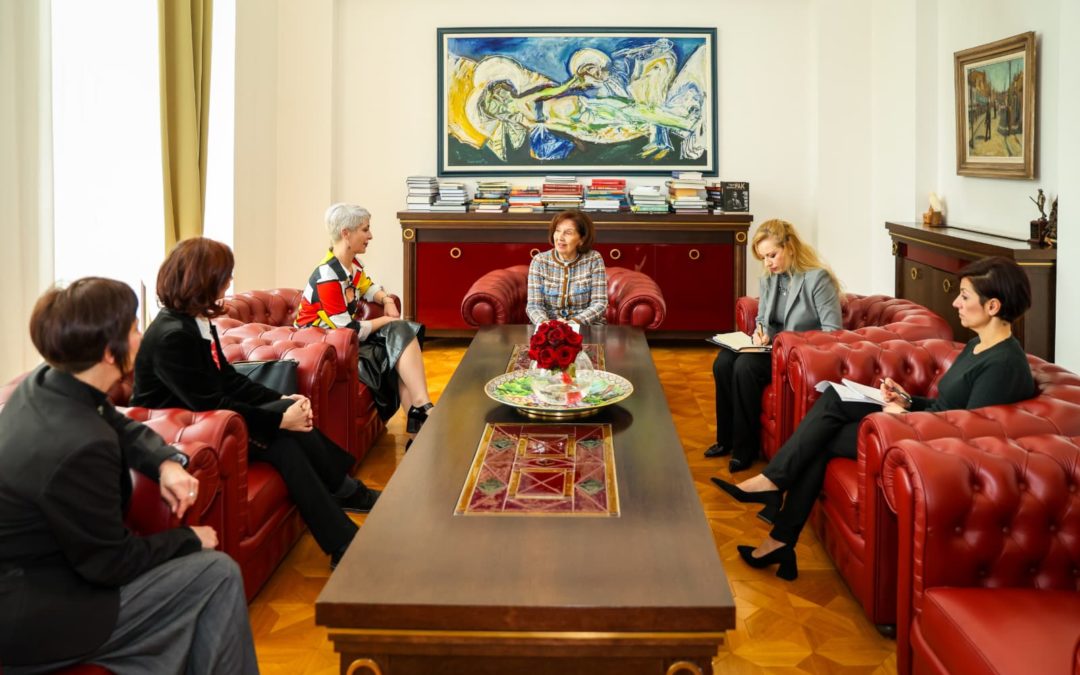Distinguished citizens,
Distinguished descendants of our Ilinden fighters that gave their lives for the freedom and the motherland,
On this greatest of holidays, we are reminded of the centuries-long Macedonian fight for an independent and soverign state. Its core values and principles are written in blood into our own pivotal Magna Carta Libertatum ̶ the Krushevo Manifesto: freedom or death, justice, equality, and coexistence.
It is for these ideals that Pitu Guli and his fellow fighters sacrificed themselves, here, at Mechkin Kamen, binding all future Macedonian generations to eternal gratitude, immortalized in the anthem before which we stand still in reverence today!
Surely, there is no one who hasn’t asked themselves: How did those timeless republican ideals find their place in our manifesto? Where can we trace the roots of the Ilinden Uprising and our Krushevo Republic?
Let me remind you. In the year 1834, Italian revolutionary Giuseppe Mazzini gathered a group of young, progressive intellectuals from several parts of our continent to present to them his vision of a Europe of nations, instead of dynasties. Through the secret society “Young Europe” they intended to mobilise the advanced European forces with one goal: to bring down the old order of reactionary empires and monarchies and to build a new, more just, European order of free, democratic republics of equal citizens instead of subjects, with guaranteed human rights and freedoms instead of inherited privileges. “Young Europe” wanted to instil the belief in the right of self-determination and to help subjugated European peoples from the Baltic to the Balkans free themselves from the rotten regimes and to move forward into a republican form of government.
It was with Mazzini, as forerunner and main driving force, that the Spring of European nations began. As a fervent opponent of the aggressive nationalism that assimilates, he fought for progressive, republican patriotism that integrates instead. To him, a nation meant a democratic community of free citizens, equal before the law, united around the common good. For him the main function of a state was not to protect the privileges of a few, but the rights and freedoms of all, regardless of affiliation.
Mazzini is known not only as a champion and advocate of the new era of democratic nation-states, but also as a passionate initiator and proponent of the creation of a United States of Europe featuring a principled foreign policy, whose main attribute is the peaceful resolution of disputes.
Nowadays his ideas are widely accepted, but in his times, they were considered dangerous and heretic. Even though he was imprisoned and persecuted, Mazzini never stopped reminding the people: “You are the true masters of your native soil; you are the sole interpreters of your own law of life.” Old regimes tried in vain to seduce or scare the masses in order to protect their own positions. The time of old regime was over.
Joining the unstoppable march of the European peoples toward freedom were the Macedonian revolutionaries, led by the man whose name and endeavours remain an eternal and inexhaustible source of Macedonian inspiration– Goce Delchev.
Although he was born just two months before Mazzini’s death, Delchev grew into a colossus of a man, one of the most steadfast continuators of his ideas. As a teacher in the Novo Selo village in Shtip, Delchev taught his students and his countrymen passionately about Mazzini’s work, his short-lived Roman Republic of the revolutionary year of 1848 and the future Paris Commune of 1871. He was so taken by the ideals of “Young Europe” that he greeted his Italian friends, through whom he armed the Macedonian insurgents, with the salute: “Viva Garibaldi, viva Mazzini!“
Both Delchev and Mazzini believed that people can only liberate themselves, through an inner uprising, without external meddling. Delchev did not want a short-lived uprising with people who would abandon him at the first failure, but rather a revolution of citizens capable of enduring all the trials of a long-lasting struggle.
Just as Mazzini travelled around Europe, spreading the idea of democratic republics, so did Delchev travel all around his motherland, preparing the people for an uprising and for a Macedonian republic.
And, finally, just as Mazzini dreamt of a European federation of republics, so did Macedonian activists Goce Delchev, Gjorche Petrov, Dame Gruev, Jane Sandanski, Dimo Hadji Dimov, Anastas Kocarev and Dimitrija Chupovski, all advocated for a Balkan federation of Republics.
This is why Mihail Gerdzhikov, one of Goce’s closest associates, testified that “for the Macedonian revolutionary cause, Goce Delchev was what Levski was for the Bulgarian, and Mazzini for the Italian people.” Delchev, as a tribune of the people and for the people, managed to spread the powerful authentic idea for a free Macedonian Republic among the people.
In May 1903, right after Goce’s death, Nikola Karev was interviewed for the Greek newspaper “Akropolis”. When asked what it is that Macedonian revolutionaries actually want, Karev answered decisively: “what we want is a Republic”.
Dear fellow citizens,
Why is it important to remind ourselves of this deep connection between the Macedonian and European republicanism? Because the Ilinden uprising and the Krushevo Republic are not isolated, local, Balkan phenomena, but belated blossoms of the European Spring of Nations from the 19th century. The last national uprising prepared in the 19th century, the Ilinden Uprising, brought forth the first democratic republic of the 20th century – the one in Krushevo! This Republic of Krushevo is the younger sister of Mazzini’s Roman Republic and the Paris Commune. It shared their ideals, the same views on governance and administration, but also their fate.
The Krushevo Republic was democratic, embraced diversity, but was also a short-lived state. However, we must not forget that it was the true harbinger of the new Macedonian republic – Macedonia of ASNOM!
Allow me to remind you: It is not per chance that on the occasion on Ilinden, 1944, Panko Brashnarov opened the first, state-forming session of ASNOM, recalling the “oasis of free Macedonia – the Krushevo Republic”. It is not per chance that the ASNOM Manifesto invokes the continuity with the Ilinden epic and the Krushevo Republic. It is not per chance that the republican and democratic ideals of the Krushevo Manifesto are built into the ASNOM documents, and through them into the foundations of the Macedonian people’s state that arose from the National Liberation Struggle!
The Macedonian revolutionaries, the progressive emigration, MANAPO, the Spanish fighters, and the participants in the National Liberation and Anti-Fascist War are all children of “Young Europe”, a democratic Europe!
This is why, for us more so than for many other nations, the Republic is a synonym of freedom, of law, of justice and equality!
Dear fellow citizens,
The republic exists to ensure common good, to the benefit of all citizens, regardless of their background or affiliation, to enable us to progress on the basis of our own knowledge, capabilities and effort, and not on the basis of status privileges and connections.
The independent and sovereign Republic of Macedonia emerged legally and legitimately in 1991, in accordance with the right of every nation to self-determination, guaranteed by the Constitution of the SFRY for the six constituent peoples and their republics, as equal members of the Federation, where the Macedonian language was one of the three official languages, as well as on the basis of the results of the referendum of September 8th, 1991, according to which a total of 1,132,981 voters participated, representing 75.74% of the electorate, out of which 1,079,308, or 72.74% of registered voters, voted ‘yes’, which amounts to 95.26% of those who turned out.
In Article 1 of the Constitution, the Republic of Macedonia was promoted as sovereign, independent, democratic, socialist state: Its central goals were established as: the rule of law as the foundational system of governance, the realization of human rights, civil liberties, and national equality, as well as peace and coexistence.
An in-depth insight into the state over recent years and decades reveals endemic corruption and organized crime, weak institutions, powerful parties and influential individuals, extrainstitutional decision-making, and partitocracy, all of which pose threats to parliamentary democracy, along with a politicized and partisan administration. Unsanctioned accountability and impunity have devastated the judiciary, degraded the environment, undermined interethnic and interpersonal relations, caused disasters and tragedies, and fostered disunity on matters of national interest, where unity is imperative!
The most promising youth, Macedonians, Albanians, Turks, Serbs, Roma, Vlachs, Bosniaks, and others are emigrating massively in the search for decent place to live. Amongs them are our fellow citizens who, due to our artificial separation from the EU and economic reasons, seek citizenship of our neighbors, members of the European Union, which in turn inspires nationalist appetites towards us.
The above stated speaks to the fact that we have forgotten the just ideals of those we honour and celebrate today.
Fellow compatriots,
It is time for a new spring for our Republic, by going back to the true republican roots. What does this mean? Macedonian citizens expect at least two things from their republic – freedom and justice. However, when I say freedom, I do not speak only of political freedom, but of economic, academic, cultural, social freedom…
When I speak of justice, I do not mean only the judiciary, but social, enviromental and generational justice.
We must not forget that that in order to have freedom and justice, we must have a rule of law and be equal before the law.
If we invoke the Krushevo Manifesto, we must remain true to its core idea, that coexistence among the diverse is built on the foundations of justice and freedom. Thus, we must root out the weeds of corruption and criminality. No one should be above the law, regardless of the fact whether they are a former or current politician or office holder, a judge or an influential businessman. For non-selective and timely justice, swift and in-depth reforms of the judiciary are needed, but those start with a European legal framework, but also European criteria for selection, as well as European standards for functioning and accountability.
We must be inclusive for those that are different, to show solidarity to those that are vulnerable and supportive for those that are the best. We need a patient-tailored and nation-focused health system. In order to have creative minds, we need investments in education and science, in research, development and digitalisation.
These days, our republic is engulfed in flames. To reduce forest fires, not only a legal framework but also an effective institutional system is needed, with the right people in key positions, an integrated preventive and volunteer dimension, and incentive measures for firefighters as primary protectors. To safeguard the health of people and nature, strict oversight must put an end to illegal dumping sites and their burning.
We need profound and substantive reforms in every sector, measured by European standards: with protected freedoms and rights, with the rule of law and uncompromising fight against corruption; by forging strategic partnerships with countries with common values and interests; with independent, functional institutions, with competitive economy and capital investments; with a participative political culture.
That is why we strive toward membership in the European Union, because it too is an ideological child of Mazzini’s ‘Young Europe.’
It is also legitimate to ask whether and to what extent is today’s European Union in tune with the ideas of its ideological creators and founders. It seems as if the shadows of old Europe are not a distant past but are unexpectedly reemerging. It has become clear that the EU is not immune to the crisis of leadership and the democratic deficit. On the contrary, these issues are glaringly evident.
But allow me to go back to Ilinden. The generation of the Ilinden uprising encountered two Europes: the old Europe of the great powers indifferently calculating the best way of cutting the Balkan apple of discord, but also, the Young Europe of the liberal and democratic public, of William Gladstone and his famous letter to Greece, Serbia and Bulgaria in 1897 to resolve the Macedonian issue, or Edward Boyle, the president of the Balkan Committee, Anatole France, Roger Casement and Hermann Wendel, of Victor Bérard and Bernard Shaw, James Bryce, who expressed friendship with the Macedonians during the Ilinden Uprising; Noel Buxton and his books about the Macedonian people; and all those who organized gatherings championing Macedonian causes, wrote appeals and petitions to their governments, asking for freedom and justice for the Macedonian people.
Even during the Second World War, the anti-fascist generation faced two Europes: the old, occupying Europe, and the young anti-fascist and partisan Europe that fought for a new order, a fruit of which in 1945 was the United Nations, which this year, marginalized and faced with wars, celebrates its eightieth anniversary, despite having been founded as a peace and anti-colonial project and having received the Nobel Peace Prize.
Even today, I notice the remnants of the old Europe: one riddled with enlargement fatigue, demanding ‘brave concessions’ from us, without having the courage to oppose double standards; Europe that permits bilateralization of our integration and tolerates vetoes based on identity and historical issues; Europe that keeps changing the rules of the game at the request of a member state; a Europe that sometimes tolerates the circumvention of its fundamental values and principles instilled in its own fundamental documents: the Treaty on EU, the Lisbon Treaty, and the Charter of Fundamental Rights.
Although the founding acts bind the Union to respect Europe’s “rich cultural and linguistic diversity,” its “national and cultural identity,” and its “dignity and integrity,” proudly defining itself as a “unity of diversity,” it turns a blind eye to their violation in the name of unity and peace within its house!
Esteemed fellow citizens,
It is strange that, in the name of freedom of thought and expression, you hear European parliamentarians challenge the Macedonian identity, 100 years after the printing of the “ABECEDAR” for the Macedonian children, in Athens in 1925, under pressure from the League of Nations! It is incomprehensible that members of the European Parliament, in the midst of the Parliament, which serves as a European school of democracy, would label you as a young people and a young state, with a modern language and modern identity.
We are not ashamed of the fact that, with our own forces, after a centuries-long fight, we managed to achieve statehood in 1944, and that we peacefully uncoupled from SFRY and acquired our independence in 1991. Quite the contrary. There are no dark spots in our history because we have never repressed, assimilated or deported. As a small, brave and peace-making nation we have always been on the right side of history, on the side of freedom, anti-fascism and anti-colonialism.
We are not a tree without roots. Our freedom and our republic are rooted in the European Spring of Nations, in the democratic and humanitarian ideals of “Young Europe”. That is why, to those that say to us “you are a young people with a young state”, we shall answer that we are the children of Goce’s vision for “Young Europe” and for a world that is a field for cultural competition among peoples!
However difficult it may be, we should not be discouraged by the hurdles we encounter. We have persevered and have managed to overcome much harder problems. We are not alone. We have friends that respect our right to a national and cultural integrity, of civic dignity and integrity, because this is something they partake in themselves. I believe in their support and help. They are not afraid to point out and oppose double standards and anachronistic attempts to revise history.
We are not diverging from on the natural path toward EU membership, because we have always been part of Europe: geographically, historically, and culturally. Simply put, we, the Balkan peoples and nations, have been, are, and will remain Europeans. We are firmly determined, as outlined in the European agenda, to reach the goal by 2030, Europeanized in line with the Copenhagen criteria!
Dear fellow citizens,
In 1943, at the 40th anniversary of the Ilinden Uprising and the Krushevo Republic, from the partisan printing house ‘Goce Delchev’ came the collection “Macedonian People’s Liberation Songs”, edited by Kocho Racin. Amongst these, there is one that best reflects the essence of today’s message. These are the closing lines of the song that lifted the spirits of the Macedonian partisans.
“And there shall be no other empire
In our dear motherland
And a republic we shall build
And freedom we shall win.”
May we mark and honour Ilinden for many years to come!
Long live the Macedonian Republic!
Long may our freedom last!
Let us fight for the European path and the European home!
